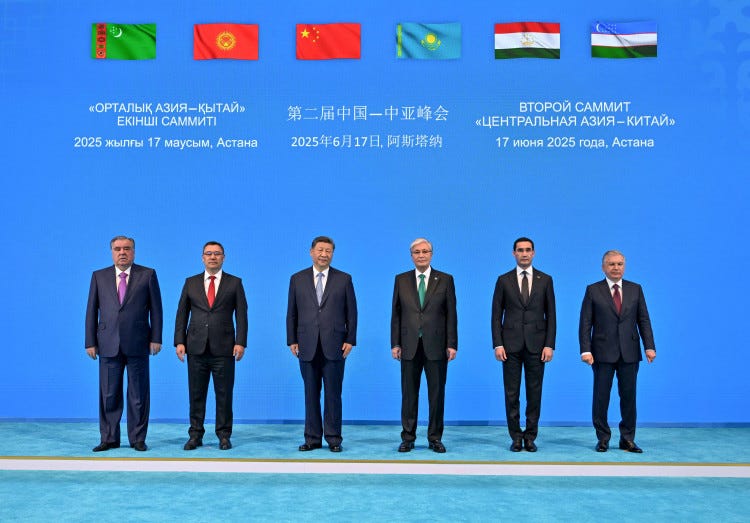Call for Multipolar World Order
Second China-Central Asia Summit Concludes in Astana With Joint Declaration
Chinese President Xi Jinping, Kazakh President Kassym-Jomart Tokayev, Kyrgyz President Sadyr Japarov, Tajik President Emomali Rahmon, Turkmen President Serdar Berdimuhamedov and Uzbek President Shavkat Mirziyoyev pose for a group photo in Astana, Kazakhstan, June 17, 2025. Photo: CPPCC
The second China-Central Asian summit concluded in Astana, Kazakhstan on Tuesday with countries signing a treaty on eternal good neighborliness, friendship, and cooperation as well as a joint Astana declaration.
The summit was attended by Chinese President Xi Jinping and the five Cental Asian presidents, Kassym-Jomart Tokayev of Kazakhstan (the host country, Sadyr Japarov of Kyrgyzstan, Emomali Rahmon of Tajikistan, Serdar Berdimuhamedov of Turkmenistan, and Shavkat Mirziyoyev of Uzbekistan.
The Astana declaration, signed by all the participants, talks about enhancing cooperation in agriculture, energy, technology and transport sectors apart from intensifying cooperation on the global platforms with a common objective of upholding the basic principles of the UN charter and developing a joint stand against hegemonic politics.
The declaration also confirmed the common stance of China and Central Asian countries to work together to stop the politicization of human rights and related issues by certain countries and talked about creating a China-Central Asia community of mutual respect and reciprocal political learning.
The countries agreed to enhance cooperation to prevent cross-border trades in illegal drugs and other prohibited elements in the declaration and agreed to work with each other to strengthen security and stability in the region.

China and Central Asian countries have developed a strong economic relationship in the last few decades, with the region being the main hub of China’s Belt and Road Initiative (BRI). According to reports, trade relations between the two have improved significantly since the launch of the summit mechanism.
The Astana Times records that mutual trade between Central Asia and China has increased nearly 35% since the first summit, topping a cumulative value of over 100 billion dollars last year.
The first China-Central Asia summit was held in 2023 in Xi’an, China.
China-Central Asia community
During his address to the summit, Chinese President Xi Jinping emphasized the next phase of cooperation under the “high-quality BRI”. The second phase of the BRI emphasizes sustainability, digital connectivity, and improved standards. In contrast, the initial phase focused on building the infrastructure and capacity for further development.
The president reiterated that there are no winners in a tariff or trade war and warned against the attempts to curtail global trade or dominate world politics. Xi noted that “unilateralism, protectionism and hegemonism will surely backfire while hurting others.”
Xi believes China and Central Asian Republics can have a win-win cooperation and announced 1.5 billion Yuan (USD 208 million) in grants to them. The grants aim to enhance public welfare and development goals in the region.
Xi mentioned that, through their collective efforts through the years, China and Central Asia have forged a China-Central spirit of “mutual respect, mutual trust, mutual benefit and mutual assistance for the joint pursuit of modernization through high-quality development.”
Xi underlined five principles for common prosperity:
Promote unity, mutual trust, and mutual support.
Optimize the cooperation framework, designating 2025 and 2026 as years of high-quality China–Central Asia development.
Establish a security framework for peace, stability, and solidarity.
Foster a shared vision and mutual affection among peoples.
Cooperate to advance a fair and equitable international order, multipolarity, and inclusive economic globalization.
Xi inaugurated three new cooperation centers focused on poverty reduction, educational exchange, and on desertification prevention and control, as well as a center to facilitate trade between Central Asian republics and China.
Leaders of the Central Asian republics underlined their growing relations with China and the need to deepen them for common prosperity and sustainable development.
They signed a treaty on “eternal good neighborliness, friendship and cooperation to enshrine the principle of everlasting friendship.” This was in addition to signing various cooperation agreements regarding BRI, mutual trade, investment, building of industries and green mining.
The heads of the five Central Asian republics expressed their willingness to cooperate and coordinate with China to safeguard free trade and multilateral trading systems. They agreed to have greater coordination on international platforms in order to create a truly multipolar world order.
The summit concluded with the announcement that the next China-Central Asia summit will be held in China in 2027.





